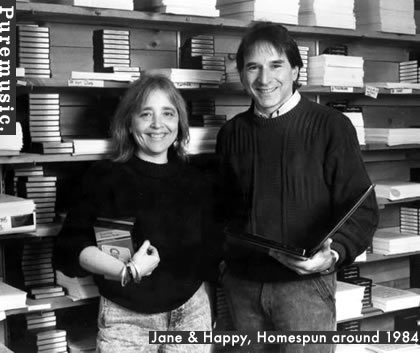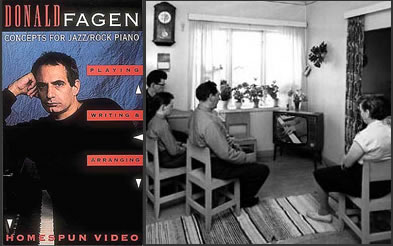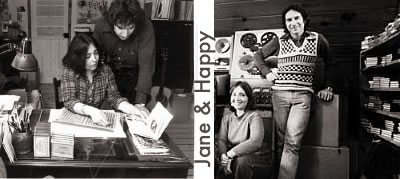
A Conversation with
Happy Traum
(continued)
PM: Would you tell us a little about your wife, Jane, and her role in the business?
HT: Yes. Jane was there at the inception. When I first started doing this, she was raising three little kids at the time, and I was on the road a lot. So whenever I was on the road, she was running the tapes off on the kitchen table after the kids went to sleep, and packing them up and sending them out.
PM: Wow.
HT: At every step of the way of the Homespun development, she was there with ideas. And she's actually kind of the brains behind the operation, and the driving force behind the business end. She also looks after the graphics. She's very involved with every cover design, every catalog that comes out.
PM: So, most every aspect of the product.
HT: We discuss which artists we're going to do, and all that kind of thing, and she's very tuned into the whole scene. But my role in it is more of getting together with the artists, deciding what to do, directing the video shoot, conceptualizing the whole musical part of it. That's kind of my role: calling the artist, getting them interested in doing it, and then following through with going into the studio with them, helping them conceptualize what they want to teach.
PM: Has anybody ever refused, for any reason, to do a tape?
HT: Yeah, we've had people over the years refuse.
PM: What's the usual reason?
HT: Various reasons. Some people are just too busy. Some feel it's not their thing, and it's very hard to get them to think otherwise.
PM: Some people think they don't have anything to say.
HT: Yes, exactly. Or that they're not the ones--"If you want to know, you should really talk to the real--"
PM: "Talk to the guy I learned from."
HT: Exactly. And some just don't--I don't know, there's a little bit of an attitude, occasionally, that I run across.
PM: Like, "Whatever I got to say is right in the record there."
HT: Right, right. But on the other hand, you get people like Donald Fagen of Steely Dan. I mean, I never thought that he would with agree to do this, but--
PM: He did one?
HT: I happen to have a personal relationship with him, but still, I was amazed that he said yes. He did a tape for us, and it's excellent.
PM: And what was the nature of his contribution?
HT: Kind of how he takes a blues type song and re-harmonizes it and makes it sound like a Steely Dan song.
PM: [laughs] Oh, I've got to get that one.
HT: It's pretty good, yeah.
PM: That's fantastic. Yeah, I'd like to understand that.
HT: It's very interesting. He did a great job. He's a very smart guy.
PM: Oh yeah.

So we're going to review the Tony Rice Master Class DVD this issue, and continue that practice of reviewing an instructional DVD from your catalog every issue for a while.
HT: Oh, that's great.
PM: And we really think our readers are going to enjoy and certainly benefit from that.
HT: And you're getting good numbers of hits.
PM: Yeah, yeah. We get a million hits a month.
HT: No kidding, great. And how do they find out about it?
PM: We have no idea. It's just really word of mouth. We've been around for six years, and a lot of people link to us. We don't advertise or anything. It's just been a grassroots growth.
HT: Wow. Fantastic.
PM: Thanks. I really enjoyed the Tony Rice DVD I watched last night and this morning, and now part of the Bryan Sutton DVD.
HT: Yeah, that's really good. Are you primarily interested in bluegrass?
PM: No, I like it all, it's just that's where I started. But no, I'm a songwriter and a fingerpicker, too, and I like to play the clawhammer banjo. And I'd like to see what Donald Fagen says about taking a blues song and reharmonizing it into a jazz pop song. It's all good.
HT: Yeah.
PM: Do you always act as host for the DVDs?
HT: No, just in the case where the artist is not comfortable or isn't used to teaching. Tony Rice is a guy, for instance, who's not a teacher. So in that case, or like with Bryan Sutton also--although Bryan, actually, about halfway through it--did you see the Bryan Sutton video?
PM: Yeah, he just started taking over.
HT: Yeah, and that was great. I mean, I started him off, and then all I had to do was watch. With Bill Monroe, John Hartford was the one who did it--he'd had a good relationship with Bill Monroe for years. And with Ralph Stanley, it was Mike Seeger, because he knew him. These were people that I didn't know very well, so I let other people be the emcee. I do it when it's necessary, and I've done it many times. But then you get guys like Chris Smither, or even Sam Bush--although I did start out with Sam, but didn't really need to. Peter Rowan, also. Sometimes guys, despite how well they play, are a little intimidated by the camera, by having to talk to a camera.
PM: Right. It's a very peculiar thing, after all.
HT: Yes. But then there are guys who are so used to teaching or doing workshops that they don't need me or anyone at all. I just direct the cameras, and I'll make comments in between takes, and tell them if they're going too fast, or you skipped over something, or you made a mistake here, you better go back and correct it. I sort of listen with a critical ear, then. So I don't always show up asking questions, as you'll see with some of our tapes, I'm not in there except as a director.
PM: And I think it's hard for a lot of musicians to understand that it’s about, "Hey, that's a really good part. Would you slow it down? Okay, now, slower than that, please..." [laughs]
HT: Right, right.
PM: Because it's nothing to the person who's playing, but to the person who's watching, it's really hard.
HT: Exactly. And I always have to put myself in the place of the student at home who's trying to learn this stuff.
PM: Yeah, because with Tony, I kept saying, boy, as many times as they went over that, I'm still going to put it on slow-mo, and make sure I got every single note of it.
HT: Well, that stuff is not for the faint of heart. It's definitely something that you have to work very hard at. And nobody is going to get it all, anyway.
PM: Right. And I think it's great that the DVDs, the first couple that I got to, have books with everything transcribed in musical notation and tablature.
HT: That's right. We try to do that with all of them.
PM: That's fantastic. continueprint (pdf) listen to clips puremusic home
